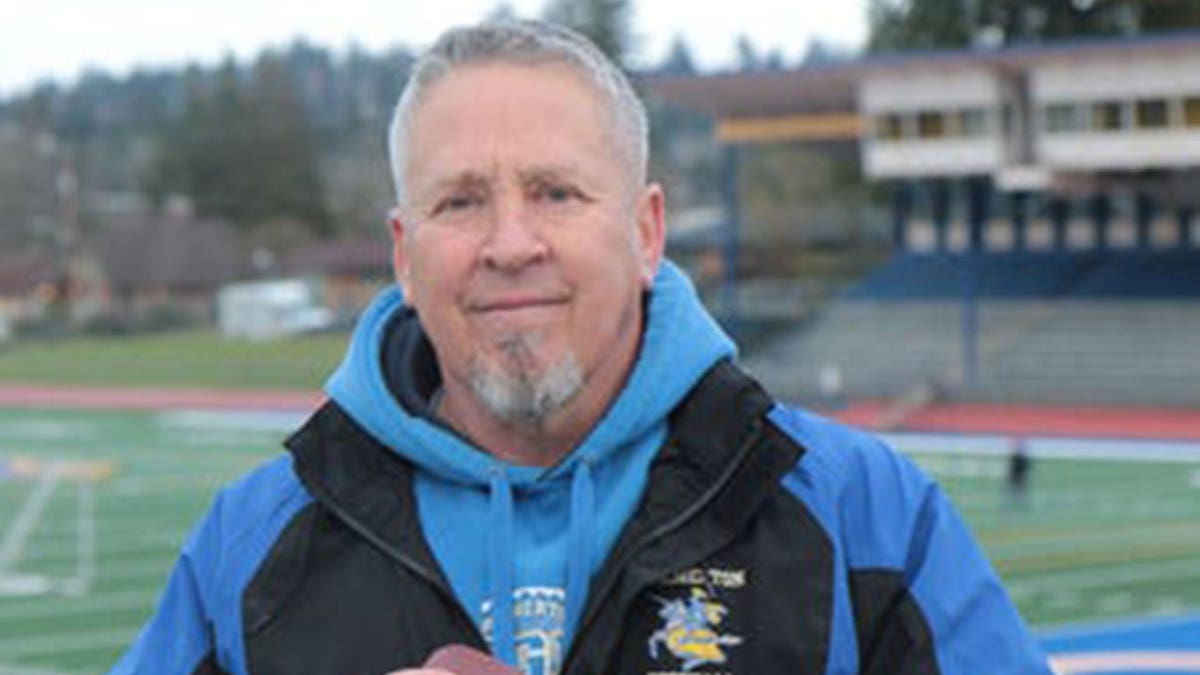Fox News Flash top headlines for April 25
Fox News Flash top headlines are here. Check out what's clicking on Foxnews.com.
The Supreme Court on Monday heard oral arguments in the case of a high school football coach who was fired over his practice of reciting a prayer on the 50-yard line following games.
Joseph Kennedy was a junior varsity head coach and varsity assistant coach with the Bremerton School District in the state of Washington from 2008 until late 2015. He claims that his termination violated his free speech and religious freedom rights. The school district, meanwhile, argue that his prayers were a constitutional problem because he is a government official, and also because of the coercive effect it may have had on students to join him.
"Mr. Kennedy’s actions pressured them to pray, and also divided the coaching staff, sparked vitriol against school officials, and led to the field being stormed and students getting knocked down," school district attorney Richard Katskee told the court. "When Mr. Kennedy repeatedly ignored sincere efforts to accommodate personal prayers, what was the district to do?"
Kennedy had initially begun the practice of reciting a post-game prayer by himself, but eventually, students began to join him. According to court documents, this later evolved into motivational speeches that included religious themes. After an opposing coach brought it to the principal's attention., the school district told Kennedy to stop. He did, temporarily, then notified the school that he would resume the practice.
The situation garnered media attention, and when Kennedy announced that he would go back to praying on the field, it raised security concerns. When he did pray after the game, a number of people stormed the field in support.
The school district then offered to let Kennedy pray in other locations before and after games, or for him to pray on the 50-yard line after everyone else had left the premises, but he refused, insisting that he would continue his regular practice. After continuing the prayers at two more games, the school district placed Kennedy on leave.
MAN TRIES LIGHTING SELF ON FIRE IN FRONT OF US SUPREME COURT
The Supreme Court focused on two issues: whether a public school employee praying alone but in view of students was engaging in unprotected "government speech," and if it is not government speech, does it still pose a problem under the First Amendment's Establishment Clause.
Kennedy's attorney Paul Clement argued Monday that this was a clear constitutional violation because not only was Kennedy engaged in private – not government – speech,, but that the school was "taking action precisely because the speech is religious."
One issue that the justices discussed with Clement was whether the prayer took place during Kennedy's duties as a coach. Justice Sonia Sotomayor asked if it would be acceptable if a teacher delivered a prayer in her classroom.
Clement replied that this would be a problem if it was during instructional time, or even before class if the prayer was audible and students were present, but not if it was an inaudible, private prayer.
Sotomayor also asked if it would be okay if a coach recited a prayer on the field while wearing a Nazi symbol as an expression of his faith. Clement noted that he was not aware of any such religion, but even still forbidding this could potentially be allowed because the censorship would not be based on the religious aspect of that activity.

Joseph Kennedy's departure as assistant coach at Bremerton High School in 2015 made headlines nationwide (First Liberty)
Several justices equated Kennedy's prayer to other First Amendment free speech expression they suggested could not be sanctioned by the school district.
Justice Samuel Alito asked whether a school employee could be punished for carrying a Ukrainian flag on school property.
Justice Brett Kavanaugh asked whether the school could "fire someone making the sign of the cross before a game?"
Justice Elena Kagan, however, expressed concern that as a coach who determines players' playing time, Kennedy's prayers could have a coercive effect on students. A lower court opinion noted that the principal had been contacted by a parent who said his son "felt compelled to participate" in the prayer despite being an atheist, "he felt he wouldn't get to play as much if he didn't participate."
Clement pushed back against that notion, stating that the school district had not made it part of its reasoning for disciplining Kennedy.
"There’s no evidence of coercion in this record," Clement said, asserting that the school district's argument was purely a concern of endorsement of religion.
To that end, Justice Clarence Thomas used a hypothetical to illustrate how a coach's actions do not have to be viewed as being endorsed by the school.
"If the coach, instead of taking a knee for prayer, took a knee during the national anthem because of moral opposition to racism, how would your school district respond?" Thomas asked Katskee. "Would that be government speech?"
CLICK HERE TO GET THE FOX NEWS APP
Katskee agreed that it would "absolutely" be government speech, given the time, manner, place of speech, and how a reasonable observer would view it.
Thomas, alluding to the publicized dispute between Kennedy and the school district, asked how such an action could be interpreted as government speech if the school district objected to it beforehand.
Fox News' Shannon Bream and Bill Mears contributed to this report.














































